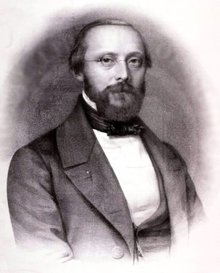Rudolf Virchow
|
|
Rudolf Ludwig Karl Virchow (October 13, 1821, in Schivelbein, Pomerania – September 5, 1902, in Berlin) was a German doctor, pathologist, prehistorian, biologist, and politician. He is credited as the first to recognize leukemia.
Virchow studied medicine in Berlin at the military academy of Prussia, where he graduated in 1843. He became professor in 1847. Due to political reasons, he moved to Würzburg two years later, where he worked on anatomy. In 1856, he returned to Berlin.
One of Virchows most famous rules is Omnis cellula e cellula ("every cell originates from another cell"). This relates to his findings that not the whole organism, but only certain cells or groups of cells can become sick. Virchow founded the medical disciplines of cellular pathology, comparative pathology (comparison of diseases common to humans and animals) and anthropology. He also suggested three main factors which predispose someone to venous thrombosis, which are now known as Virchow's triad.
Virchow also worked as a politician (member of the Berlin City Council, the Prussian parliament since 1861, German Reichstag 1880-1893) to improve the health care conditions for the Berlin citizens, namely working towards modern water and sewer systems. As a co-founder and member of the liberal party (Fortschrittspartei) he was an important political antagonist of Bismarck.
In 1869 he founded the Society for anthropology, ethnology and prehistory (Gesellschaft für Anthropologie, Ethnologie und Urgeschichte) which was very influential in coordinating and intensifying German archaeological research.
In 1892 he was awarded the Copley Medal.
Reference
- A biography of Virchow at Whonamedit.com (http://www.whonamedit.com/doctor.cfm/912.html), including phenomena named after him
External link
- Collected Works (http://virchow.info/) (German)de:Rudolf Virchow
eo:Rudolf Ludwig Karl VIRCHOW fr:Rudolf Virchow ja:ルドルフ・ルートウィヒ・カール・ウィルヒョー nl:Rudolf Virchow

